
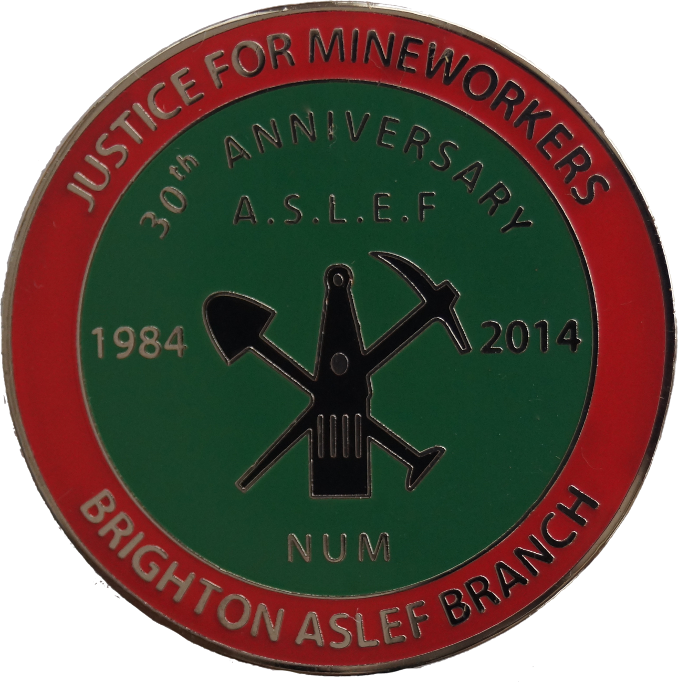
LOCOMOTIVE JOURNAL
JANUARY 2014
36 years marked at Selhurst branch
Geoff Hagan recently retired after 36 years on the railway in District 1. His career started at Folkestone central in 1977; he moved to Ashford as a freight guard the same year. He then changed ends to the front as a trainee driver at Norwood Junction in 1988 and obtained his key in 1998 before transferring to London Bridge in 2000. After an unfortunate fall in 2007, Geoff took a short hop to Selhurst where he has worked for the past 3 years as a cleaner, retiring in July 2013. He was presented with a retirement certificate by national organiser Simon Weller. Geoff thanked Roy Luxford and ASLEF’s company council for making his last few years possible.
Andrew Cook,
Selhurst Branch secretary
LOCOMOTIVE JOURNAL
SELHURST BRANCH
JANUARY 2014
MARK PALMER
Honey Monster
Mark Palmer, a big man in every sense, leaves a hole in the hearts and memories of Selhurst train crew after his sudden passing in August.
Mark came to the railway at the age of 18 in 1983 to work at East Croydon in the buffet serving the breakfasts. Marky, Honey Monster or Mr Jerk Chicken Man, as he was affectionately known, used to be a shy and quiet stick insect, believe it or not!
As the old boys know only too well, drivers used to like a drink at work (‘Really?’ do I hear you say) and when, one day, he refused to serve one in uniform that really upset the driver and didn’t bode well for Mark’s future.
But that changed when he got a job as a guard in 1986 and started to come out of his shell. Though some pranksters at Norwood thought it would be a good laugh to climb to the top of the old water tower before it was demolished. Mark got six feet up before vertigo set in, asking for a parachute and having to be helped back down!
He was the last of the second men at Norwood to come to Selhurst for his driving job in ’88. That was when we started to see the real Mark we knew and loved. He was much more confident, relaxed and very sociable and always enjoyed the supper club, going to different restaurants andtrying different food along the way – not so much of the stick insect any more.
He was on the social committee and kept the peace among some of the more rowdy members. He was a loyal and keen ASLEF member and took great pride in supporting the local staff reps as a co-opted rep at meetings and was also in charge of the lottery syndicate – so, if you have any influence upstairs, Mark, please sort out those numbers for us!
One of Mark’s downfalls was early turns which he hated with a passion as he loved his bed. The managers knew to look out of the window for him as he always left it to the last possible minute to get into work – even though he only lived up the road. In recent years he worked a permanent late shift but the managers still had to look out of the window for him. Because Mark has worked both shifts over his many years at Selhurst he was well known and liked across the whole company and there will be a lot of slimmer staff now as they’re missing his patties and jerk chicken.
With Mark’s passing it feels something is missing; he was one of the real characters on the railway and still, to this day, brings a smile to your face when you are reminded of his daily banter and joking around. A collection was held and a memorial bench has now been installed at Selhurst; so if you’re ever visiting us, please take a while to sit and smile and to remember Mark Palmer – a friend to all.
Secretary
Selhurst Branch
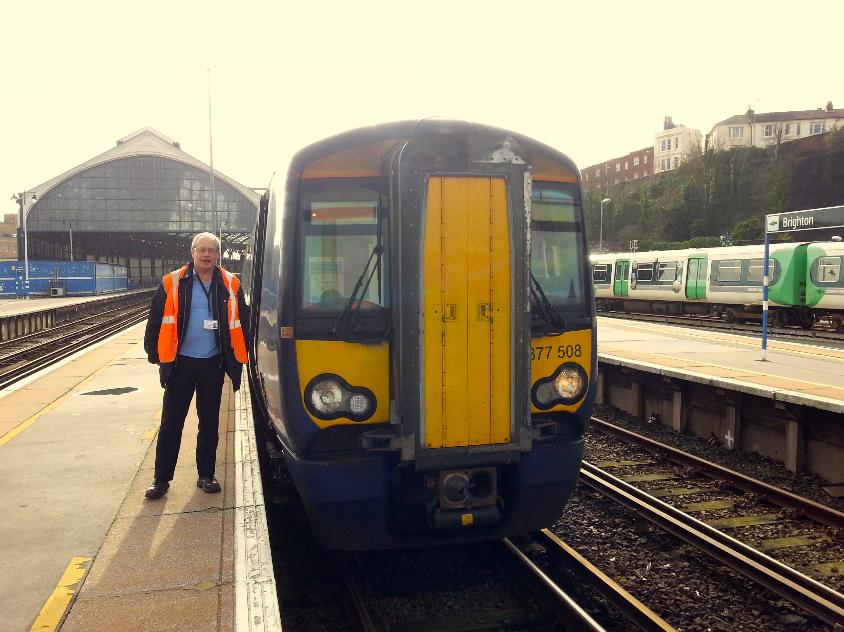
STEVE CHATFIELD COLLECTION
Thameslink Company Council/Brighton Driver
Tony Farmer, working the first electric train to Brighton Top Yard
Monday 17th February 2014
LOCOMOTIVE JOURNAL
HORSHAM BRANCH
APRIL 2014
Illusion of democracy
I read with interest Glenis Willmott’s article in the January Journal. What Glenis failed to mention is that the EU Parliament has little or no power, so it doesn’t really matter what the UKIP group or Labour group votes for. All the power at the European Union rests with the 27 commissioners, only one of which represents the UK. Most people don’t know who their EU Commissioner is, largely because not one of us had the opportunity to vote for her (there’s a clue) as she was appointed.
The EU Parliament exists to create an illusion of democracy. It does not have legislative initiative; it is not able to initiate laws and policies, which is precisely what you would expect a Parliament to be doing. It votes on the regulations and directives created by the commissioners and their army of bureaucrats. But even if Parliament votes against a piece of legislation, the commissioners could, and would, overrule that decision. At best they can tweak it slightly and claim to have made major changes, in the same way that the failed EU constitution became the Treaty of Lisbon.
If the UK were to withdraw from the EU, it would once again be up to our own government at Westminster to introduce legislation through a democratic process. This is not perfect, but at least you know who your MP is and it’s straightforward to lobby them, as an individual, or a union, and if said MP doesn’t shape up, you have the opportunity to select someone else at the general election, unlike the EU Commissioners, who are accountable to no one.
Ken Hall,
Horsham Branch
LOCOMOTIVE JOURNAL
BARNHAM BRANCH
APRIL 2014
Where there’s a will
I would like to thank ASLEF for the opportunity to attend a public speaking course, which was advertised by a circular, at the Workers’ Education Association in London. I found it very informative and entertaining. My wife and I also took up the offer of a free will writing service; a straightforward process which saved us £130 on the price quoted by a local solicitor.
Dave Winter,
Barnham
West Sussex
Presentations made at the Brighton A.S.L.E.F. Reunion
6th May 2014
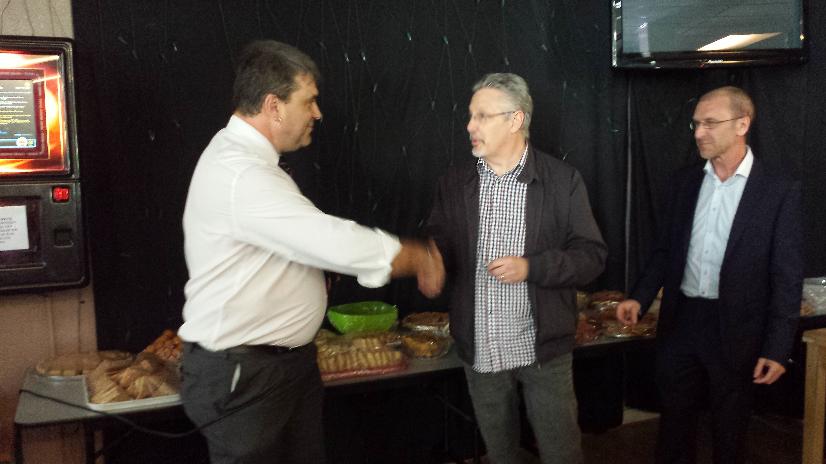
COLLECTION
DANNY LODGE
RECEIVING HIS 40 YEAR BADGE
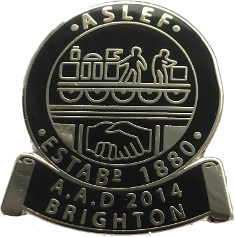
To celebrate A.S.L.E.&F. 2014, Annual Assembly of Delegates being held in the Old Ship Hotel, Brighton. The Brighton Branch Secretary, Mark Johnson, created a commemorative badge (above) with the idea that would be given to the A.A.D. Delegates as a souvenir of their time at 2014.
This badge was not considered appropriate by A.S.L.E.&F. Therefore the badge was sold to Brighton A.S.L.E.& F. members to finance the commemorative badge, and a general sale badge would be sold. There was also three other colours produced and the black is a limited edition.
At the 2016 A.A.D in Aviemore, a badge was produced by A.S.L.E.&F. for their delegates attending this annual conference and every since then a badge as been created to celebrate this annual event.
LOCOMOTIVE JOURNAL
JUNE 2014
CLIFFORD CLARIDGE
GREAT CHARACTER
Sadly, I have to report the death of a great character, Clifford Cyril Claridge, on 31 March. He was 74. Cliff started at Willesden Stonebridge Park, then went to Wimbledon and Victoria. He always had a joke or story to tell, and was good at cooking Sunday breakfast for the drivers on duty. Cliff had to come off the front with hearing loss and went into the offices, and retired in 2003. Our thoughts are with his wife Linda and family at this sad time.
Ken Heydon,
Battersea
LOCOMOTIVE JOURNAL
BRIGHTON BRANCH
SEPTEMBER 2014
Looking through someone else’s eyes

Back in April, Leigh Gibbins, from Blind Veterans UK, formerly St Dunstan’s, got in contact asking if I would be prepared to give a talk regarding the history of Brighton’s railways. He said he enjoyed visiting my website Brighton Motive Power Depots, a history of ASLEF in Sussex, and that the charity he worked for were doing a theme week on Planes, Trains & Automobiles for their residents, some of whom have totally lost their vision. (St Dunstan’s was founded in 1915, as a convalescent home and training centre for ex-servicemen who lost their sight on active service, and moved to Ovingdean near Brighton in 1938).
On 11 July Ivan Wilson, who had kindly travelled down from Scotland for the event, Mick
Hawkins and I, all former L.D.C. reps at Brighton, went to the Blind Veterans’ centre to give
our first public speech on this subject. We were joined by Tim Wood, whose book, Southern
Electric Driver, tells of life on the last of the old slam door trains on Southern region. We
started at 7pm, and didn’t finish until gone 10pm. The veterans seemed very interested and
asked lots of questions about life on the footplate, the railway in general, our trade and our
union.
PAUL EDWARDS COLLECTION
Ivan Wilson, chair of Polmadie branch, with the big screen
Paul Edwards,
Brighton Branch
LOCOMOTIVE JOURNAL
CATERHAM
SEPTEMBER 2014
FRIEND AND BROTHER NEV
NEVER HELD BACK
After nearly 25 years on the railway, D.I. Neville Huntingford retires this year from Caterham depot in Surrey. Nev started his career at Orpington before relocating to Caterham in the early 1990s. Quickly progressing to Driving Instructor, he also became the depot’s Local Staff Representative, a post he was proud to hold for 12 years. Always a lively debater in mess rooms throughout Southern Metro, Nev was a strong union man and never held back in dealings with management. As a well respected D.I., many a new driver has benefited from his experience over the years, as a solid turnout of over 60 at his farewell in Purley bears witness. With nine years served in the army prior to your time on the railway, Nev, you have served your country and your colleagues well. Friend to many, Brother to all, we salute you! And wish you many years of happy retirement near your family in Scotland, together with your dear wife Ann.
Trevor Hallett
Caterham

SARAH McCABE COLLECTION
Mac McCabe arriving at Brighton on his last working day Thursday 18th September 2014
LOCOMOTIVE JOURNAL
OCTOBER 2014
THREE BRIDGES
Thank you, Brothers
I would like to thank Graham Morris and Southern DFC for all their help in getting my job back. I would also like to say a massive thank you to all the depots that also voted for action in support of me; I was deeply touched. And a massive thanks to all my friends and colleagues for your support, without which I don’t think I would have got through this horrible period in my life.
My brave daughter Eleanor contracted meningitis when she was eight, which led to complications, including endocarditis, which severely damaged her heart. After six cardio bypass operations she needed a heart transplant.
We were very fortunate that she received a new heart but she had complications and we nearly lost her on several occasions. I had trouble sleeping and my health deteriorated as a consequence. I was then given 12 weeks’ notice. But, thanks to ASLEF, and the support of my colleagues, I am now back driving, with my health issues behind me, and looking forward to extending my 27 years of service. A big thank you to you all.
Mark Taylor,
Three Bridges
REMEMBERING BRIGHTON ENGINEMEN
DRIVER MICK GUPPY & FIREMAN JOHN MYLES
ON SUNDAY 26th OCTOBER 2014
HORSHAM RAILWAY STATION
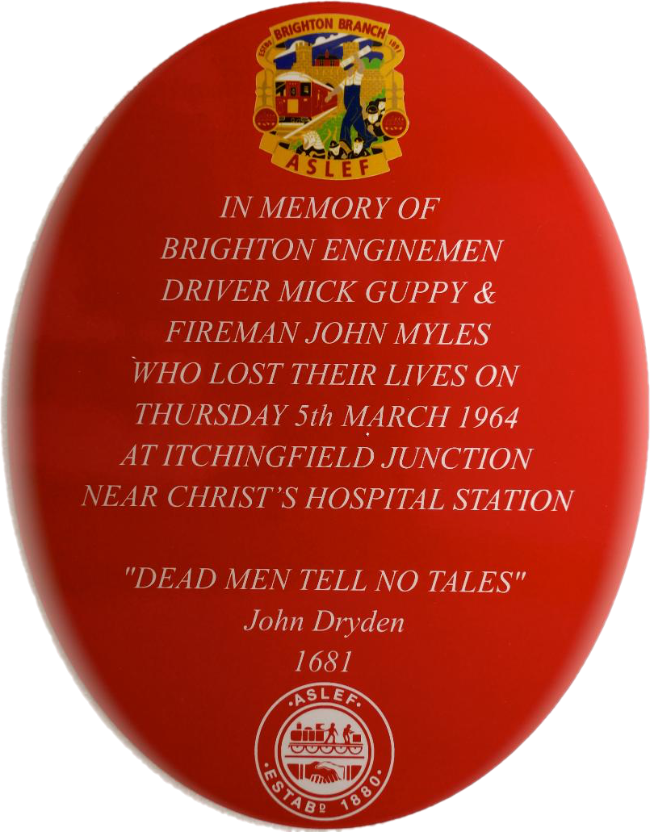
LOCOMOTIVE JOURNAL
OCTOBER 2014
THREE BRIDGES
Livin’ La Vida Loca
Ian Hunt’s pre-wedding celebrations were full of fancy dress and tomfoolery. Ian turned up as southern trains’ loco Toledo and, with 14 chums, including nine other southern staff, jetted off to Madrid for a weekend stag party which included a trip to the Bernabéu stadium to watch Real Madrid. Thankfully, Ian returned in one piece, and is now happily married to Laura. Congratulations to the happy couple from all his friends and colleagues at Southern trains.
Paul Eden,
Three Bridges
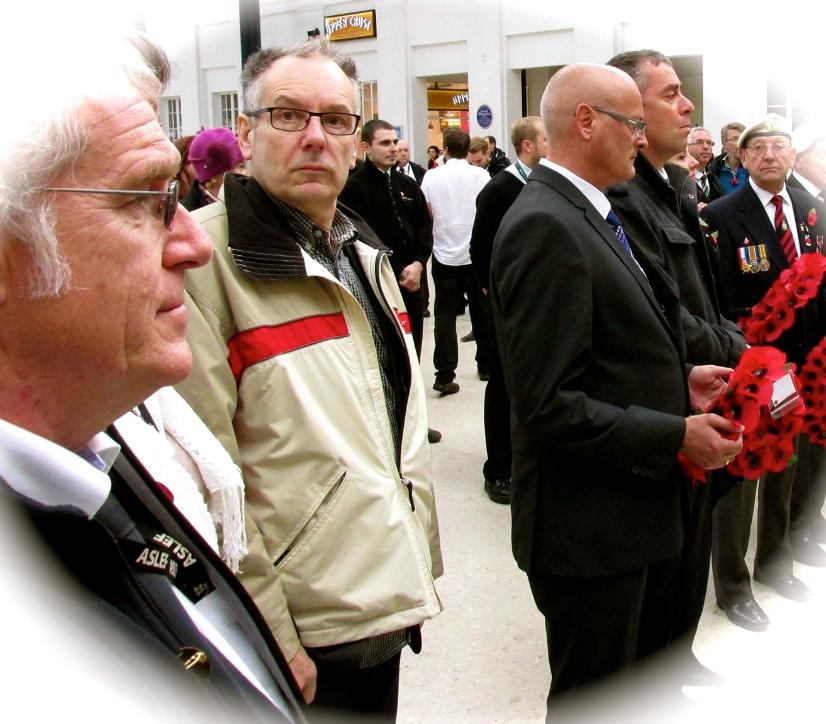
Chirs Newton Collection
Left - Right Tony Brace (Ass Branch Secretary), Anthony Williams,
& Dave Devonport (Vice Chairman).

ONE OF TWO VERSIONS (RED & GREEN) OF THE ITCHINGFIELD BADGE DESIGNED BY PAUL EDWARDS AND MARK JOHNSON WHICH RAISED FOR THE MEMORIAL PLAQUE AND RECEPTION
LOCOMOTIVE JOURNAL
DECEMBER 2014
DEAD MEN TELL NO TALES
MARZ COLOMBINI
reports on a memorial to the two men who died at Itchingfield
In the early hours of 5 March 1964 at Itchingfield junction, three miles from Horsham, a collision between two goods trains tragically left two ASLEF members, driver Mick Guppy and fireman John Myles, dead.
Fifty years on, to mark the anniversary, Brighton branch held a remembrance ceremony in honour of their two lost brothers which included the unveiling of a commemorative plaque. Be it Clapham, Cowden or Itchingfield, our industry has an analytical talent for reducing rail accidents to a collection of facts, figures, findings and recommendations. It is worth wondering to what extent, had Mick and John survived and given evidence to the subsequent inquiry, the findings would have differed. A question that gives rise to the quote on the memorial plaque, from The Spanish Friar by John Dryden, ‘Dead men tell no tales.’
The memorial event held at Horsham station on Sunday 26 October was, first and foremost, about the human side of the Itchingfield crash, and while ASLEF branches across the division were represented, including Brighton, Horsham, Barnham, and Three Bridges, most poignant were the contributions from the men’s families who thanked ‘ASLEF for all the moral and financial support given at the time’ which clearly has not been forgotten.
Branch chair Steve Chatfield, N.O. Simon Weller and D.O. Graham Morris invited members of our brothers’ families to formally unveil the plaque in the booking hall at Horsham.
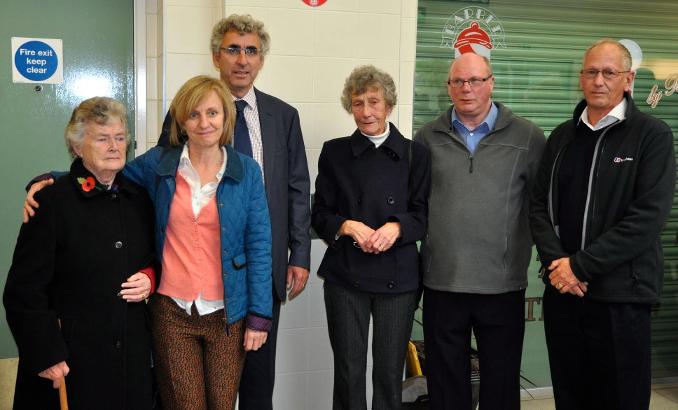
LOCOMOTIVE JOURNAL
DECEMBER 2014
reveals the truth about TTIP which neoliberals on both sides of the Atlantic don’t want you to know
What do you know about the transatlantic trade & investment Partnership? not a lot? Well, here’s a crash course to bring you up to speed. We need to be concerned because this is one of the most dangerous, and invidious, trade deals ever done.
T.T.I.P. is a proposed free trade agreement between the European union and the united states of America which would hand enormous powers over to big business, threatening public services, workers’ rights, food safety and the environment. it is a direct attack on our democracy.
SECRET COURTS
But all our political parties, except the greens, support this agreement on the grounds that it will ‘make us better off’. The Labour Party backs the idea, but not the right of companies to sue governments, and the Liberal Democrats are adopting the same stance. But the hypocritical Conservative Party, which wants to repatriate laws from the E.U., including those that gave us the working time directive, paid holidays, and the right to sickness leave not counted as holiday, is prepared to enter into an agreement being negotiated in secret by the very bureaucrats they like to criticise on a daily basis.
This trade agreement, if it goes through as drafted, will give multi-national companies based in offshore tax havens and us corporations the right to sue democratically-elected governments which pass laws which, they think, will affect their profits or shareholders. And such claims will, shamefully, be heard in a secret court with no right of appeal. What price democracy?
The # no T.T.I.P. Times reports that Slovakia was forced to pay €22 million to the insurer Achmea when it tried to introduce public health insurance. Egypt is being sued by Veolia for $80 million for raising the minimum wage. Argentina has coughed up more than $1 billion after being sued by water and electricity companies (including E.D.F.) for freezing utility prices. Australia is being sued by Philip Morris for protecting public health by introducing plain cigarette packets and the tobacco giant has threatened to sue the U.K. government if it follows suit. And Canada is being sued for $500 million by the us drug company Eli Lilly because it refused a patent on one of the firm’s drugs (it doesn’t do what the company claims) and is, consequently, ‘depriving us of expected future profits.’ It’s outrageous!
NO PUBLIC OWNERSHIP
And it means we would be unable to bring industries, like the utility companies, and our own railway industry, back into public ownership as the companies that own or operate these industries would be off to the secret court to stop it.
The Council of Europe would give big business, and their oily lobbyists in Brussels, the right to be involved in the law-making process long before any public democratic debate takes place.
Food safety, consumer protection, the environment and many other areas would be jeopardised because ‘free trade’ and the right of capitalist companies ‘red in tooth and claw’ to ride roughshod over regulations to protect people would take precedence. Trip would entrench in law privatisation – allowing a few to exploit for private profit what should belong to us all – and the capitalist model of running an economy which has failed most of the people of this world.
Medicines will become much dearer as companies act to prevent inexpensive generic treatments being produced and brought to market. Data exclusivity will mean that clinical trial data can only be used by the company that paid for the trial. A similar rule forced the Jordanian government to spend an additional $22 million on brand name drugs between 2002 and 2006.
STANDARDS AT RISK
T.T.I.P. will also allow the big pharmaceutical companies to sue countries that use their legal right to access generic medicines in a health emergency. Countries around the world are already facing lawsuits for implementing proper public health policies from multinationals more interested in making money than saving people’s lives.
The safety standards on which we rely for everything we buy will be put at risk by T.T.I.P. as will the energy and climate policies needed to save our planet. Ditto the new financial regulations designed to prevent banks from gambling with our money and creating another global economic crisis.
The world’s biggest industrial conglomerates, agribusinesses and financial service providers want to rewrite these safeguards and enshrine ‘corporate rights’ behind closed doors. so if genetically modified frankenstein food doesn’t make it through formal negotiations, ‘regulatory co-operation’ will give agribusiness a permanent mechanism for promoting these dangerous products.
Please contact your M.P. and M.E.P. and make your views known, as if this goes ahead, as currently drafted, we might as well not bother electing any representatives ever again.
LOCOMOTIVE JOURNAL
DECEMBER 2014
“I, I WILL BE KING AND YOU,
YOU WILL BE QUEEN WE CAN BE HEROES,
JUST FOR ONE DAY”
Why do some members become ASLEF activists or politically active in any form? This was a question I was asked recently and, in many cases, it is hard to say. But, for me, it was an
accident, nothing planned, no great design; just a sense of ‘that’s not right.’
It also has to be said at the outset that there was a great deal of encouragement from a
particular member: Dave Griffiths, who made it his business to ensure that the young upstarts at Aberystwyth were encouraged ‘to get involved’ and have their say as well as ‘have a go’ as branch officers. there was also Mick Richards, another ASLEF man through and through, who showed me how to handle a train. A tale in itself...
TRACTION TRAINEE AT WATERLOO
My entry into the footplate grade was nothing unusual–i was at a bit of a loss for a job after
my initial choice fell apart (light engineering was not such a great career choice in the mid-
1980s as the recession bit deep) – so I stumbled into a job as a traction trainee at Waterloo at the giddy pay rate of £72.40 a week. ‘this will do for a couple of months,’ I thought...it was not a bad job (although drivers would always say it would get better, one day) and a decision to move as a driver’s assistant from Waterloo to the small depot at Aberystwyth was one of my better ones. Although basing a career move on memories, as a child, of enjoyable family holidays in the area is possibly not the most mature approach to a career move.
It was a very unusual depot at the end of a branch line that seemed to move back in time as it progressed to the Welsh coast. unusual and retro to the extent that there were still steam
engines on the narrow gauge line out of Aberystwyth operated by British Rail until 1988.
their sell off precipitated the depot’s closure in 1989: perhaps the first taste of rail
privatisation. there were some great ASLEF stalwarts at Aber amongst the establishment of
ten drivers, who provided an incomparable education for a 19- year-old like me. the fact that Aberystwyth was a holiday destination, university campus and had a nurses’ training hospital also had certain appeal for a young second man about town.
TRADE UNION YOUTH CAMP
But let’s fast forward nearly 28 years, leaving behind the misty-eyed nostalgia, and return to
the original question. Why, when you’ve got the job, do some people become activists and
where do they come from? For me, it was the encouragement of Dave Griffiths, who
suggested I attend a trade union youth camp, very common things back in the day. In many
ways, this event shaped my political outlook and trade union activism. It was a ten day youth camp for young trade unionists from around the world, held in the german Democratic Republic (East Germany, as was) to see ‘socialism in action.’ it is at this point that one of life’s lessons was learnt. never trust a country with Democratic in its name for they are
usually anything but (of the Democratic Republic of Congo, the People’s Democratic
Republic of Korea, the Lao People’s Democratic Republic, etc).
Seeing the destructive effect of an authoritarian stalinist state up close, through the eyes and
the experiences of citizens from the GDR, some of whom became lifelong friends, changed my perception of authority. it was not something to defer to but something to be challenged – wherever it lay.
The disconnect between what was preached in East Germany and what was actually
happening made me more determined to effect change at home. Those experiences gave
direction and conviction to my approach to ASLEF.
A FRIEND’S FLAT IN BERLIN
As I write this, sat in a friend’s flat in Berlin, it is the weekend celebrating the 25th
anniversary of the wall coming down, an event I ridiculously missed by two hours back in
1989 (although I may have one of the last stamped exit visas from that
particular day) but it serves to draw a neat parallel.
The last 25 years have been tumultuous for ASLEF – preparation for privatisation, and
privatisation itself, changing the fundamental nature of the railway here in Britain. the
imposition of new bargaining machinery in an attempt to break the union’s hold on
negotiations and a total shift in the footplate grade’s demographic could have meant the end
of what was, in many ways, an old fashioned, traditional, craft union.it was not the end
because we used the changes to create a seismic shift away from the culture of the past with
huge improvements in salary from £11,500 then to an average now of £44,000; from one rest day every eight weeks to the four day week we enjoy now; and the abandonment of an unfair and non-guaranteed bonus system to clean salaries..
We now had a bargaining machinery led by lay reps who knew their areas, who took
ownership of the drivers’ charter, and responsibility for their actions. the industry’s attempt to localise the nature of negotiation allowed the reps, as part of an overall strategy, to control overtime. And we used that control as a lever to create new jobs and improve long-term conditions across the whole of our profession.
NEXT GENERATiON OF DRIVERS
In addition, despite the nature of the railway changing following accidents, reorganisations
and outside ideological interference, we have fought ferociously to defend our members and
the security of our employment.
Although there were what could politely be described as adventures, distractions and
disagreements along the way, there was always clear direction in the form of the ASLEF
charter and commitment from the reps at all levels to ensure the creation and defence of good jobs for the next generation of train drivers.however, what of the next generation of ASLEF activists, where are they coming from? With the demise of the driver’s assistant the supply of young workers joining the railway in their teens is no more and neither, fortunately, are the politics of the Cold War. so how do we react to the generational change within our membership that has quietly occurred over the last 25 years?
SPACE TO MAKE MISTAKES
I think we still need to take a leaf out of Dave Griffiths’ and Mick Richards’ book and give
encouragement and support to those who show an interest. They may not be kids straight out
of school nowadays but the next generation still need the support and space to make their
mistakes and learn their lessons through doing – none of us has a monopoly on what is right
or wrong.
We all still have huge battles ahead, particularly as the wider politics of the day become
increasingly unequal, small minded and spiteful. The broad political understanding of the
past has given way to a narrow economic orthodoxy that is short term and unfair in its
nature.
We might be seeing ever more people tricked into voting against their own interests at the
next general election but we must ensure that whoever is representing ASLEF members 25
years hence does so from a position of strength. We must all give consideration to who will be standing in our shoes in the future – the graveyards are full of indispensable men – and we all need to be preparing and encouraging the next generation of ASLEF men and women.

ARTIST UNKNOWN